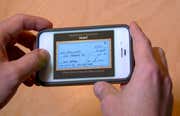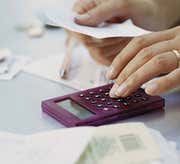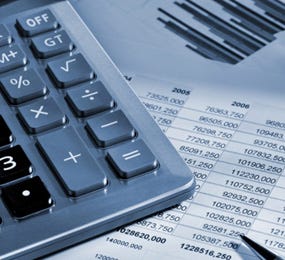Because your checking account is the nexus of all your banking activity – the main place that your money flows into and out of – you'll need to do a few things to keep an eye on your money and avoid problems. In this section, we’ll talk about how to monitor your checking account balance and the risks of spending more money than you have.
Balancing Your Checkbook
The most basic way to manage your checking account is by balancing your checkbook. This is nothing more than recording the dates and amounts of all your withdrawals and deposits – and doing the math that lets you know how much money is truly available to you at all times. This knowledge is important because between the time you schedule an online bill payment and the date the transaction posts – or between the date when you write a check and the date when the recipient deposits it – you might forget all about a transaction and end up overdrawing your account and incurring unnecessary fees. This also includes noting debit card purchases that come out of your account.
In the age of electronic banking, checkbook balancing is not as straightforward as it once was. Most people have money entering and leaving their accounts through methods other than writing and depositing traditional paper checks, and withdrawing and depositing cash. We receive direct deposits from employers and set up automatic monthly payments for recurring bills like auto loans. We get cash back at the grocery store when we shop with our debit card. We schedule payments online through the websites of various service providers. And when a friend needs to pay us back, they might do it electronically.
It's important to keep track of each of these transactions in a checkbook, spreadsheet or via whatever other method keeps you on top of the amount of money you can spend without overdrawing your account. Then, when you receive your monthly account statement, check all the transactions on your statement against your checkbook entries to make sure that everything matches and there are no omissions or mathematical errors. When everything matches, your checking account is considered "balanced". (It's important to keep a handle on your finances, even if your spouse does the accounting. Read Why You Shouldn't Let Your Partner Do the Books to learn more.)
If you're not willing to make the effort to balance your checkbook, keep a generous cushion in your account – a sum of money that you never use to pay bills or make purchases but keep solely to prevent bounced checks, declined transactions and overdraft fees – and monitor your balance daily. If you're signed up for online or mobile banking, it only takes a minute a day to stay on top of your account activity. Text and email alerts can also help you stay current on your balance and other account activity. Some banks let you check your balance by initiating a text. You can also call the number on the back of your debit card and get your balance by phone.
Bounced Checks/Bad Checks
Balancing your checkbook and monitoring your balance can help you avoid bouncing checks. If you write a check for a higher amount than what you have in your checking account, it's considered a bad check and it will "bounce," meaning that the person or business you wrote the check to won't get any money. You'll still be on the hook for what you owe, but you'll now also owe that person or business for the bounced check fee that their bank probably charged them (usually around $25). Also, your bank will charge you a non-sufficient funds (NSF) fee for not having enough money in your account to cover the check.
Getting an account with overdraft protection can eliminate the problem of bounced checks and prevent you from paying returned check fees to others. However, you’ll still pay overdraft fees to your own bank. (For more insight, see The Ins And Outs Of Bank Fees.)
Overdraft Protection
If your checking account has overdraft protection, your bank will pay any checks you write that exceed your account balance (up to a certain amount) and charge you a hefty sum for the privilege in the form of an overdraft fee. Depending on the bank’s policy, this fee may be charged on every check you write that exceeds your balance, no matter how large or small the amount. This means that if you have $2 in your account and write a check for $5, you can get slapped with a $39 overdraft fee. Some banks, however, waive overdraft fees when you overdraw your account by less than $10. Overdraft protection also means that when you use your debit card for a purchase that you don’t have enough funds to cover, the bank will still honor the transaction and the merchant won’t decline it, but you’ll pay overdraft fees for this privilege.
Two alternatives to the bank's overdraft protection are to keep a cushion in your account and to link a savings account to your checking account. Some banks will waive overdraft fees when your checking account balance is insufficient to cover a check as long as they can obtain the necessary funds from your savings account. Bear in mind that you may still pay a lesser "overdraft transfer fee" for each occurrence. Some banks also allow you to use a credit card that is linked to your checking account to cover any transactions that you otherwise wouldn’t have the money for.
Online and Mobile Banking
Online banking allows you to use a computer with an internet connection to access your accounts through a secure, password-protected online system. Via online banking, you can check your account balances, move money between accounts and pay bills electronically. Online banking allows you to access your account from anywhere in the world, any day of the week, at any time of day and as often as you want, for free.
If you're going to bank online, it's essential that you use safe internet practices to protect your account information from hackers and thieves. We'll go into this in more detail in Chapter 10. (To learn more about internet banking, check out Online Banks: Lower Cost and Little Sacrifice.)
Mobile banking allows you to accomplish most of the same things you can do with online banking, except you use your smartphone or tablet instead of a computer. The quality and capabilities of mobile apps, like online banking platforms, vary by bank; some are more user friendly and offer more functionality than others.
Handling Bank Errors
Unlike in Monopoly, if the bank commits an error in your favor, you should not spend the money. The bank can charge you with theft if you do. This may seem unfair since it was the bank's mistake. But when you look at it from the standpoint of spending money that isn't yours, the theft charge makes a lot more sense.
While bank errors are a rare occurrence, if extra money somehow ends up in your account, notify a bank supervisor immediately and leave the extra money alone. If your contact with the bank supervisor is in person or by phone, follow up on this interaction with a letter so that you can provide documentation of the issue later if needed. Even if the money remains in your account for years, the bank could finally figure out its error one day and take it back. Of course, you can still spend whatever money in your account is rightfully yours. But spending money that has been erroneously deposited into your account could land you in jail.
If the bank makes a mistake that is not in your favor, such as losing your deposit, act quickly. Federal law allows just 60 days to report the error to your bank from the date the bank statement showing the error was sent. You'll probably notice the error much sooner and want your money back right away, so the 60-day window shouldn't pose a problem in most circumstances.
Bring the problem to the bank's attention, keeping in mind that if the first bank employee you talk to isn't helpful, you should try talking to others and even escalating the problem to management. If none of these reasonable measures succeed, you can contact the Office of the Comptroller of the Currency, a division of the U.S. Treasury entrusted with "ensuring a safe and sound national banking system for all Americans."
Next, we'll talk about your options for setting aside extra money for a rainy day or a special occasion and helping it grow through a savings account.
Banking: Savings Accounts 101
-
 Personal Finance
Personal FinanceThe Complete Guide to Checking Accounts
Here is the A to Z of checking accounts: types of accounts, basics on check writing, debit cards, overdraft protection and much more. -
 IPF - Banking
IPF - BankingHow Overdraft Fees Work and How to Avoid Them
Overdraft fees in checking accounts can mount up quickly. Here are four ways that account holders can avoid them. -
 Personal Finance
Personal FinanceWhen Good People Write Bad Checks
Overdraft protection can help when you overestimate your balance, but it will cost you. -
 Personal Finance
Personal FinancePros and Cons of Overdraft Protection
Checks and other debit transactions always clear when you sign up for overdraft protection but the bank may charge hefty overdraft fees. -
 Personal Finance
Personal FinanceThe 4 Most Costly Banking Mistakes
It's difficult to avoid bank charges, but taking the time to avoid these four costly mistakes will save you money. -
 Personal Finance
Personal Finance5 Bank Fees You May Not Know About
Banking regulations have recently changed and fees are following suit. -
 Personal Finance
Personal FinanceCut Your Bank Fees
Find out how to get the bank to pay you for using their services, not the other way around. -
 Personal Finance
Personal FinanceForget Your Bank Account - Use Your Credit Card
What if you used your credit card as a bank account? Believe it or not, this strange strategy could actually work.



